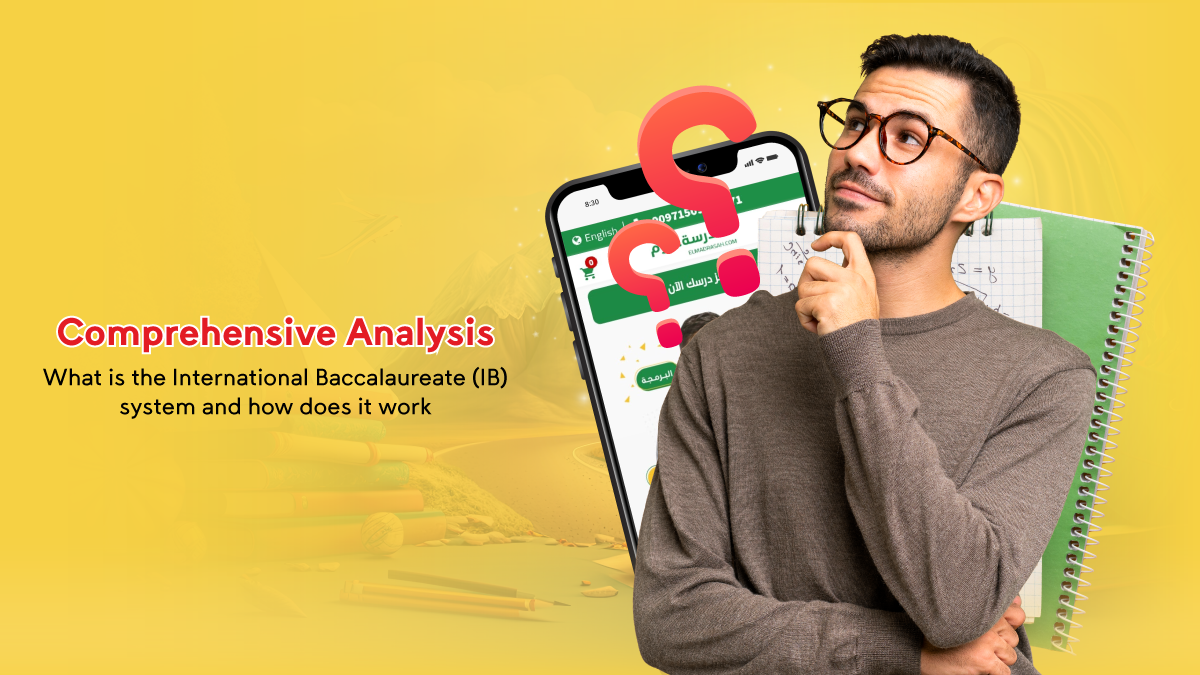
The International Baccalaureate -IB- system is a global educational system that aims to develop students comprehensively and prepare them to face the challenges of the modern world efficiently. This system relies primarily on advanced, multi-dimensional educational curricula that include various subjects that enhance critical and analytical thinking, encourage innovation and development, and enhance cultural and social awareness.
What distinguishes this system
IB programs are characterized by the spirit of comprehensive and interactive learning, where students are encouraged to explore topics in-depth and apply concepts in real-life contexts. The system also offers a variety of subjects and electives, allowing students to tailor their educational experience to their interests and skills.
Through its focus on deep learning and personal development, the system seeks to achieve a comprehensive educational vision aimed at preparing its students for an active role in their communities and the world at large.
What is the International Baccalaureate -IB- System?
The International Baccalaureate -IB- system is a recognized global education system that aims to provide a comprehensive education characterized by challenge, diversity, and personal development. The IB system offers various educational programs targeting students at different educational stages, from kindergarten age until the final years of secondary education.
IB programs aim to develop students comprehensively by encouraging critical thinking, promoting innovation and deep learning, and promoting cultural communication and international cooperation. The system also features advanced, multi-dimensional curricula covering a wide range of subjects and subjects, allowing students a rich and diverse educational experience.
The IB system is based on four main programs:
-
Primary Three-Year Program:
Aimed at children from Kindergarten to 12 years of age.
-
Middle Basic Education Program:
Targets students in the early years of secondary education (ages 11 to 16).
-
IB Diploma Programme:
Targets students in the final years of secondary education (ages 16-19).
-
Basic Education Program:
It offers an integrated program that combines academic, applied, and vocational education.
The International Baccalaureate -IB- system is considered among the newest and most advanced educational systems in the world, as it provides students with opportunities to develop their skills and abilities, paving the way for them to face the challenges of the contemporary world with confidence and competence.
How does the IB system work?
Many students wonder how the IB system works because of its development, modernity, and ability to provide opportunities that help students develop personal skills and abilities. The IB system also relies on comprehensive and advanced educational curricula that aim to develop students comprehensively across several aspects:
-
Curricula and Materials:
The IB system includes a range of subjects and curricula covering a wide range of subjects, from science and mathematics to social studies, arts, and languages. These curricula are designed to encourage critical thinking and creativity and stimulate interest in multiple areas.
-
Comprehensive Assessment:
The IB system features a comprehensive assessment approach that focuses on developing skills and concepts, and students are assessed continuously throughout the academic year through tests, projects, and group work.
-
Professional Training for Teachers:
IB teachers receive extensive training to implement curriculum, and assessment methods, and communicate with students effectively.
-
Personalized Learning:
Students are encouraged to set their own educational goals and participate in a variety of extracurricular and community activities.
-
Hands-on learning:
The IB system encourages hands-on and experiential learning through exploration, research, and practical application of school concepts.
International Baccalaureate exams are organized globally, where students sit final exams in subjects and are assessed based on these exams as well as work submitted during the academic year.
The International Baccalaureate -IB- system aims to develop students as responsible global citizens and lifelong learners. It seeks to promote international understanding, cooperation, and respect between different cultures and individuals. The system challenges students academically and opens the door to higher education opportunities and employment at global universities and institutions.
It is worth noting that the IB system requires strong collaboration, interaction, cooperation, and communication between teachers, students, and parents, as the system relies on the application of curricula and guidelines provided by the International Baccalaureate Organization and requires a strong commitment to standards of quality and educational excellence.
Therefore, the IB system is considered a comprehensive framework that provides an educational environment that stimulates students to think critically and develop their personal and academic skills, which paves the way for them to achieve success in various areas of their lives and their academic and professional careers.
What are the main benefits for students studying in the IB system?
There are several key benefits that students who study in the IB system can gain, including:
-
Developing academic skills:
The International Baccalaureate -IB- system aims to develop students’ academic skills comprehensively, as students learn how to think critically, solve problems, analyze, and interact with information systematically and deeply. These skills enhance the ability for independent learning and qualify students to prepare for future academic challenges.
-
International Learning:
Students in the international system have a truly international learning experience as they learn about different cultures, organizations, and customs from around the world and learn how to cooperate and communicate with others from different backgrounds, which helps them develop global understanding and the ability to work with others in diverse groups.
-
Preparation for higher education:
The International Baccalaureate -IB- system is considered an excellent preparation for higher education because it provides high-level academic challenges that enhance students’ abilities and help them adapt to the university environment. In addition, many universities around the world recognize the International Baccalaureate degree and consider it a positive factor in the admission process.
-
Personal skills development:
The International Baccalaureate -IB- system encourages the comprehensive development of students’ skills, as they learn the skills of leadership, communication, organization, endurance, and self-analysis. These skills will be valuable in their personal and professional lives in the future.
-
Global Awareness:
Students’ global awareness is promoted in the IB system. They learn about contemporary world issues such as sustainable development, human rights, and multiculturalism. Students are encouraged to become responsible global citizens and active contributors to their communities and the world in general.
These are some of the main benefits that students who study in the IB system get, and it is worth noting that there can be other benefits as well, as the benefits vary from person to person depending on their educational and professional needs and goals.
The main differences between The International Baccalaureate -IB- system and the traditional system
Many students want to know whether there are any differences between the IB system and the traditional system, as knowing these differences helps in deciding whether to follow either system. There are many main differences between the IB system and the traditional system. Here are some of the main differences:
-
Methodology and curriculum:
The International Baccalaureate -IB- system differs from the traditional system in methodology and curriculum. In the traditional system, the main focus is on memorizing information and taking tests, while The International Baccalaureate -IB- system focuses on developing academic skills, critical thinking, analysis, and active learning.
-
Number of subjects:
In the traditional system, students are offered a limited number of subjects that they have to pass, while the IB system includes a wide range of subjects that students can choose according to their interests and abilities.
-
Assessment and correction:
The IB system is provided with a comprehensive assessment that includes homework, internal tests, and final exams, where students’ work is corrected by internal teachers and the International Baccalaureate Organization. In the traditional system, assessment is mainly based on final exams that are corrected by schools.
-
Independent learning and cooperation:
The IB system encourages independent learning and cooperation in groups. Students are encouraged to carry out research projects, present results, and communicate with colleagues in the educational process. This approach aims to develop personal skills and the ability to work together.
-
International recognition:
The International Baccalaureate degree is internationally recognized and accepted by many universities and educational institutions around the world. This means that students who study in The International Baccalaureate -IB- system have greater opportunities to enroll in international universities and higher education.
These are some of the main differences between the IB system and the traditional system. It should be noted that these differences may differ from one country to another because they reflect the general differences between the two systems. Students and parents should consider these differences when deciding on education according to the student’s needs and goals.
List of subjects that students can choose in the IB system
The IB system offers a wide range of subjects that students can choose according to their interests and skills. However, the actual choice of subjects may vary between schools according to available resources and local study plans. Through the following we will review the main areas of subjects in the IB system, which are as follows: :
-
First Language:
This field relates to studying the student’s first language, such as English, Arabic, Chinese, etc., as the International Baccalaureate system offers multiple options for literary and linguistic lessons in this field.
-
Second Language:
This field relates to the study of a second language, such as English, French, Spanish, etc. This field also provides a variety of levels and options for learning a second language.
-
Science:
This field relates to the study of sciences such as physics, chemistry, biology, environmental sciences, and earth and space sciences. Students can also choose to specialize in one of the sciences or choose a variety of sciences.
-
Social Studies:
This field concerns the study of society, history, geography, economics, politics, and philosophy, and the International Baccalaureate system offers a wide range of subjects in this field.
-
Mathematics:
This field concerns the study of mathematics at different levels, from basic mathematics to deeper mathematics such as advanced mathematics and statistics.
-
Arts and Design:
This field relates to the study of various arts such as music, drawing, photography, design, and dramatic performance and the IB system offers various options to choose from.
Remember that this list only shows the main subject areas, and within each subject area, there can be a wider range of specific subjects. For students to obtain more specific information about the subjects and choices available in the IB system, it is recommended to check the IB website or Contact schools that offer this system to obtain a detailed list of available subjects and specific study options for each field.
How are students’ work corrected in the International Baccalaureate system?
In the International Baccalaureate -IB- system, work is corrected in multiple and comprehensive ways aimed at ensuring fairness and objectivity, as there are several ways through which students’ work is evaluated and corrected, including:
-
Internal assessment:
This assessment includes the work that is completed and presented in the classroom during the academic year. These works are evaluated by teachers and are based on the evaluation criteria determined by the IB.
-
Final exams:
At the end of each program (such as the IB Diploma Programme), students pass final exams that aim to assess their level of achievement in different subjects. These exams are graded by specialized evaluators working for IB who follow precise grading guidelines.
-
External Evaluation:
These works include several research projects, creative works, and reports, which are submitted for evaluation by external evaluators. These evaluators are specialists in their fields and evaluate the works based on the evaluation criteria pre-determined by the IB.
The IB system aims to ensure fairness and objectivity in evaluating student work and to provide an equal opportunity for all students to excel and succeed. Marking processes follow strict and objective standards that aim to provide a fair and equitable evaluation for all students.
The role of the Elmadrasah.com platform in facilitating the process of learning the International Baccalaureate -IB- System
Elmadrasah.com platform plays an important role in facilitating the process of learning the International Baccalaureate system -IB-, due to the countless educational resources it provides in all fields and for different ages, by relying on teachers with the highest degree of experience and competence in how to deal with international education systems and their ability. To help students achieve their academic goals with ease, the platform’s role in the International Baccalaureate system is highlighted in several ways, which are as follows:
-
Online Educational Resources:
The Elmadrasah.com platform provides a wide range of online educational resources such as educational videos, recorded lectures, articles, and e-books where students can use these resources to enhance their understanding of concepts and expand their knowledge in different subjects.
-
Providing an interactive learning environment:
The platform provides an interactive e-learning environment for students to study materials, practice exercises, and solve questions. The platform also helps students develop their skills and understanding of concepts by providing personalized and recurring learning and immediate feedback.
-
Online educational forums:
The Elmadrasah.com platform provides online educational forums and communities where students can communicate with their colleagues, teachers, and experts to discuss topics and exchange knowledge and experiences, where students can ask questions, get answers, and benefit from the experiences of others.
-
Digital platforms for evaluation:
One of the most important features of the platform is that it provides tools to evaluate performance and provide comments on student’s performance in tests, exercises, and projects, where students can review their performance and identify strengths and points of improvement through Elmadrasah.com.
-
Communication and distance learning:
The Elmadrasah.com platform can be used to facilitate communication and distance learning between students and teachers, as teachers can give lectures online and provide academic guidance and support to students through online communication means such as virtual classes, email, and live chat.
It is worth noting that the use of electronic platforms to facilitate learning in the International Baccalaureate system depends on the availability of the necessary technological infrastructure, such as Internet connectivity and appropriate electronic devices. Electronic platforms should also be used as a supplement to traditional education and not a complete substitute for direct interaction between students and teachers.
In conclusion, the International Baccalaureate system is a comprehensive and stimulating educational experience that aims to develop students comprehensively and prepare them to face the challenges of the modern world with competence and confidence. Through its diverse and innovative programs, the IB system seeks to develop student’s academic, personal, and social skills, and motivate them to explore, innovate and think critically.
With its focus on deep learning and personal development, the IB system helps students build their capabilities and enhance their future skills and paves the way for them to excel in their academic and professional life areas. In addition, the IB system contributes to enhancing cultural communication and international cooperation between students from different parts of the world.
The importance of the Elmadrasah.com platform in the International Baccalaureate system cannot be denied as a vital tool to enhance the learning experience and enhance access to educational resources. The platform is also considered an effective means that aims to facilitate communication between teachers and students and provide educational content diversely and interactively.
Through the Elmadrasah.com platform, students can access various educational resources from anywhere and at any time, which contributes to enhancing their flexibility and motivating them to continue the learning process. In addition, these platforms provide an interactive educational environment that encourages interaction and cooperation among students and enhances Self-learning and continuous development.
Thanks to the development of technology, electronic platforms have become an integral part of the learning experience in the IB system, and are considered a vital tool for enhancing effectiveness and efficiency in learning. As technological developments continue, electronic platforms are expected to play a greater role in improving and enhancing the learning experience in the future.
In short, the International Baccalaureate -IB- system is a fun and exciting educational journey that allows students to discover their potential and realize their ambitions and paves the way for a bright future full of achievements and successes.















